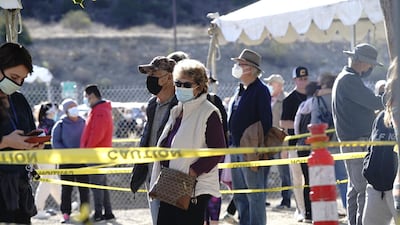The head of California's funeral directors association says mortuaries are being inundated as the United States passed the grim tally of 350,000 Covid-19 deaths.
More than 20 million people in the country have been infected, according to data compiled by Johns Hopkins University.
“I’ve been in the funeral industry for 40 years and never in my life did I think that this could happen, that I’d have to tell a family, ‘No, we can’t take your family member,’” said Magda Maldonado, owner of Continental Funeral Home in Los Angeles.
There is growing concern that a new strain of the virus, which is significantly more transmissible and was detected in Colorado last week after emerging in the UK, could complicate efforts to defeat Covid-19.
Current vaccines are thought to be effective against the new strain, but the US is now in a race against time to protect vulnerable citizens as cases surge once more and the vaccination programme falls behind schedule.
The US rate of new Covid-19 infections increased in the second half of last year. An analysis of Reuters data shows it took 200 days to reach the first five million cases, 93 days to go from five million cases to 10 million, 31 days from 10 million to 15 million cases and only 25 days to go from 15 million to 20 million cases.
California has the most cases of any state, with more than 2.3 million infections in total, followed by Texas with 1.8 million cases and Florida with 1.3 million.

